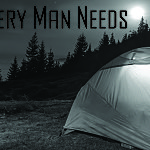Finding Freedom From Anxiety
My freshman year in high school, I ended up with a late lunch period with mostly upperclassmen I didn’t know. I clearly remember walking down into the cafeteria unsure and fearful about where I should sit. I tried eating with a few freshmen I didn’t know and then with some sophomores I barely knew. In both cases, I felt unwanted, like an intruder. So for the next few days, I tried another tactic: I sat by myself at an empty table. It took care of my social anxiety, but now I felt shame at being perceived as a complete misfit, provoking only more anxiety. So I made a crucial decision: I quit going to the lunchroom and ate lunch by myself in the locker room. Sure, I was lonely, but I wasn’t anxious anymore.
"I was in bondage to anxiety, trapped emotionally, and unable to grow into a man."
This story exemplifies my "modus operandi" with anxiety, something I have struggled with for much of my life. There have been the usual anxious thoughts like most men over money, future, and career. But this anxiety goes deeper. It’s not just worry about this or that; it’s anxiety about life itself. I tried to avoid most of it by simply sticking to the few things I was good at. But this tactic cost me dearly. I was in bondage to anxiety, trapped emotionally, and unable to grow into a man. This is where so many men also find themselves. Perhaps you find yourself there too. How can Jesus come and save us?
The same way He did it with the disciples during the feeding of the 5,000 (Mark 6:30-44). There is something so important about this miracle that it is mentioned in all four gospels. It communicates something crucial about Jesus, both His person and the kind of life He is calling us into as men. And it is the only miracle where Jesus creates the crisis that He alone can solve. Here they are, out in a desolate wilderness, with literally thousands of people flocking to hear Jesus’ words. Sounds great for the ministry, but there’s only one problem. No food—and no place to get it. Then Jesus stuns the disciples by insisting that they provide the food for the massive crowd. Talk about an anxiety-producing situation! Finally, He asks the disciples about their own provisions, which are ridiculously minuscule compared to the need.
So into this crisis, Jesus comes as the true Shepherd to provide rest, provision, and guidance, the great lesson He wanted to teach those twelve disciples. The people are instructed to sit down in the green grass, which grew in wilderness places after the winter rains. The picture of resting on green grass evokes images of Psalm 23 (lying in green pastures). And there is not just sufficiency to fill each stomach, but superabundance. Each disciple went around with his customary basket and filled it with the leftovers.
So what does all of this have to do with our anxiety as men? I can only tell you how it has worked for me, but I believe He works in similar ways with all of us. Just like the miracle, Jesus created a crisis in my life, asking me to leave behind financial and emotional security and enter the unknowns of starting a ministry. The crisis engendered an anxiety that I could no longer avoid and one that only He could solve. Into that turbulence, He then showed up repeatedly as the good Shepherd, offering rest, provision, and guidance in stunning ways. In a manner I could have never predicted, it freed me from the bondage of anxiety and allowed me to take on the mantle of manhood. If he can do that for this anxiety-prone heart, He can do it for any man.
Trust me. Just ask Him.
Bill Delvaux is a graduate of Duke University and Trinity Evangelical Divinity School and has served as a pastor and a high school Bible teacher. Presently, he leads Landmark Journey Ministries as a speaker, small group coach, and author of Divided: When the Head and Heart Don’t Agree and Landmarks: Turning Points on Your Journey Toward God. Bill and his wife have two grown daughters and reside in Franklin, TN. Follow Bill on Twitter @BillDelvaux.





